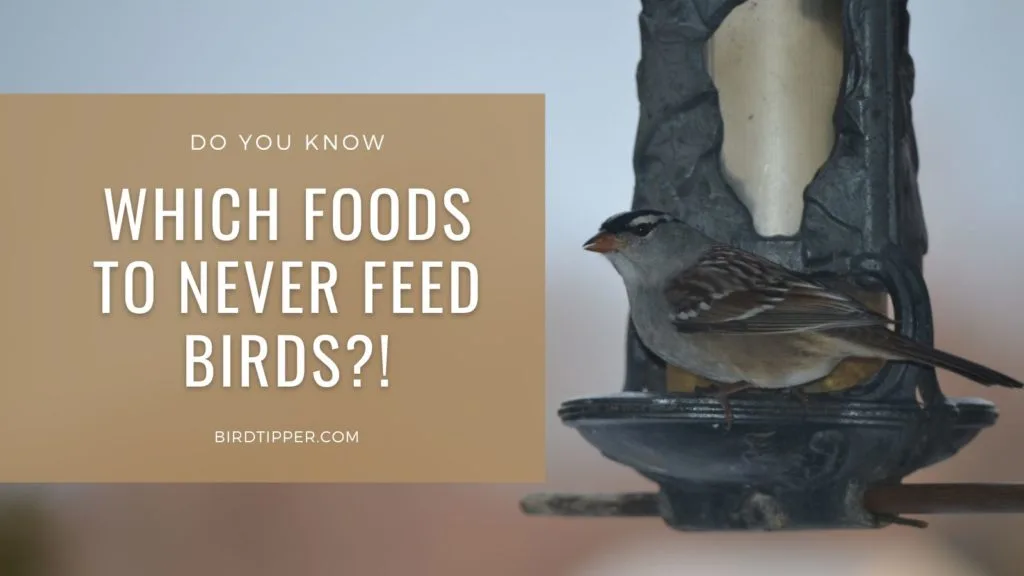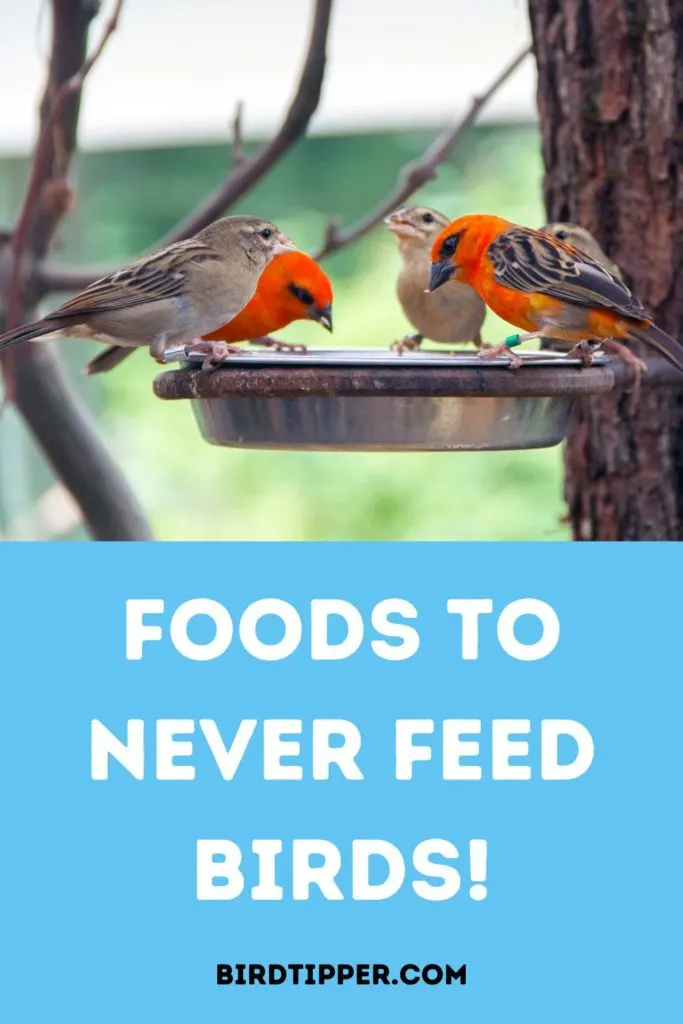We love adding some kitchen foods and homemade treats to our bird feeder as occasional snacks and meal variety for the birds–but it’s important to know what NOT to feed wild birds, too! Here’s a list of foods to never feed to birds–some which aren’t surprising but some that you may have never realized could be deadly.

Alcohol
It’s always important to keep all forms of alcohol away from birds; don’t leave a drink lying around for birds to discover.
Apple seeds
Apple seeds contain amygdalin which, when it degrades, leads to cyanide poisoning. The fruit of the apple itself is safe for birds and a great winter treat–but be sure to remove the seeds!
Apricot pits
While it is safe for birds to eat the fruit of an apricot, the seed or pit (sometimes called a pip or kernel) of the apricot is NOT safe. Like several other fruit seeds, apricot pits contain amygdalin, which can cause cyanide poisoning. Never grind up pits to create food…just throw them away safely.
Avocados
While avocados may be considered a superfood for us, avocados are toxic for birds. This is due to an natural fungicide in the plant called persin found in every part of the plant. Keep the avocados for yourself and keep them out of the bird feeder!
Chewing gum
OK, this one almost goes without saying but don’t feed birds chewing gum or discard chewing gum where birds might swoop in and pick it up. Besides the choking risk, the gooey mess can stick to their feathers and become a real hazard.
Cherry pits
Yep, cherry pits are another fruit seed that contains amygdalin–and can lead to cyanide poisoning.
Chives
Chives fall in the same family as onions–a definite no for birds. Consumption of chives can damage the red blood cells of birds and lead to anemia as well as cause digestive upset.
Chocolate
Chocolate is toxic to birds in all forms–milk chocolate, dark chocolate, chocolate chips, chocolate cake, you name it. Keep the chocolate for yourself!
Coffee (and other caffeinated drinks)
The caffeine in coffee can cause cardiac issues and even death in birds.
Desiccated Coconut
Desiccated coconut–the dried, shredded coconut that’s used on many cakes–is dangerous for birds because when consumed it will quickly rehydrate in the bird’s stomach. Serve only fresh coconut (which birds will love) and keep the shredded coconut for your own sweets.
Garlic
If a bird swoops in and grabs a bite of pizza, the garlic isn’t going to hurt him, but too much garlic can damage red blood cells and cause digestive problems.
Leeks
Like chives, onions and garlic, leeks belong to the Allium family and all are toxic at different levels to birds.
Onions
Don’t toss the outer part of an onion out for the birds; like chives, leeks and garlic, onions are toxic for birds.
Peach pits
Like apricot, cherry, apple and other stone fruit pits, peach pits contain amygdalin–which means there’s a risk of cyanide poisoning as the amygdalin degrades.
Plum pits
Another stone fruit like peaches and apricots, plum pits contain amygdalin, creating a cyanide poisoning risk.
Porridge (cooked)
Porridge oats can be fed to birds when DRY but cooked porridge should be thrown away. The gluten in the porridge creates a sticky mess than can harden up on a bird’s beak.
Scallions and Shallots
See Onions
Tea
Like coffee and other caffeinated drinks, tea can cause an increased heart rate, hyperactivity, increased blood pressure and cardiac arrhythmia.
Xylitol
Used in some diet foods and all diet gums (as well as everything from toothpaste to some vitamins), Xylitol is highly toxic to animals. It is especially worrisome that a few peanut butters–a favorite ingredient at the bird feeder–now contain Xylitol. Be sure to read the ingredients list for anything that you suspect MIGHT have Xylitol in it; it is sometimes also labeled as “Birch sugar.“
Uncooked beans
Uncooked beans–the dry beans in the sack–should never be fed to birds. Dry beans contain hemagglutinin which can be deadly to birds. First, cook the beans before feeding them to birds–they’re a good source of fiber and protein.
Uncooked potatoes and potato peels
Baked potatoes and sweet potatoes are favorite foods at the bird feeder–but NOT uncooked potatoes and potato peels. Raw potatoes contain an enzyme inhibitor called protease which then causes difficulty breaking down the food and obtaining the nutrients. Cook all potatoes before feeding them to birds. The best way to serve them is baked, avoiding the fat and salt of fried potatoes.
Pin it to remember what not to feed wild birds!

